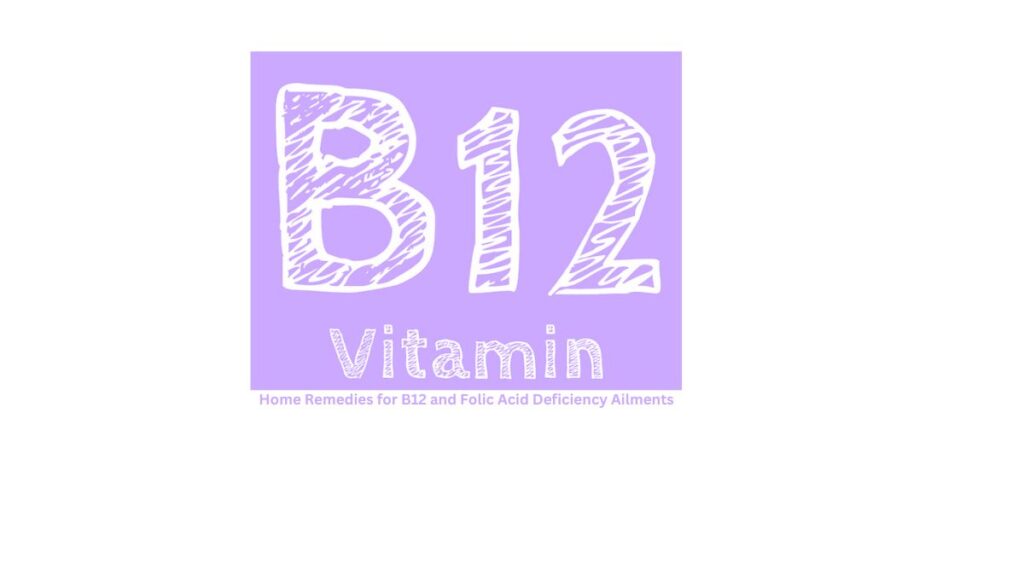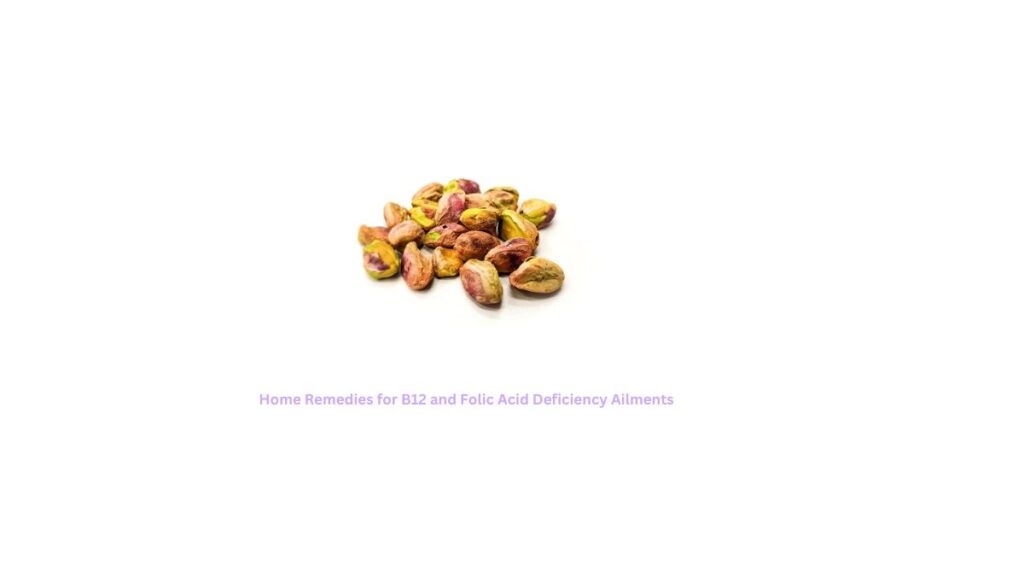Introduction:-
Effective Home Remedies for B12 and Folic Acid Deficiency Ailments
In a world where wellness is paramount, addressing vitamin B12 and folic acid deficiencies through a holistic lens is key to optimal health. These essential nutrients play a crucial role in various bodily functions, and their deficiencies can lead to a range of ailments. Fortunately, there are natural and accessible remedies that can help alleviate these deficiencies and restore balance to the body.
Understanding B12 and Folic Acid Deficiencies

Vitamin B12 and folic acid are vital for maintaining healthy nerve function, supporting red blood cell production, and aiding in DNA synthesis. However, certain dietary restrictions, medical conditions, or lifestyle choices can lead to deficiencies in these nutrients. Symptoms may include fatigue, weakness, pale skin, shortness of breath, and neurological issues such as tingling or numbness in the hands and feet.
Holistic Home Remedies for B12 and Folic Acid Deficiencies
Embracing a diet rich in foods high in vitamin B12 and folic acid is the cornerstone of addressing deficiencies. Incorporate sources such as fortified cereals, leafy greens, legumes, eggs, dairy products, seafood, and lean meats into your meals.
2. Supplementation:
In cases where dietary intake alone may not suffice, supplementation can bridge the gap. Consult with a healthcare professional to determine the appropriate dosage and form of supplements tailored to your individual needs.
3. Herbal Remedies:
Certain herbs like spirulina, seaweed, and nutritional yeast can provide a natural boost of vitamin B12. Additionally, incorporating herbs such as parsley, spinach, and fenugreek into your diet can enhance folic acid intake.
4. Lifestyle Modifications:
Adopting a healthy lifestyle can aid in nutrient absorption and utilization. Prioritize regular exercise, manage stress levels, ensure adequate sleep, and avoid smoking and excessive alcohol consumption.
5. Sun Exposure:
Vitamin B12 synthesis in the body can be enhanced by exposure to sunlight. Aim for moderate sun exposure while practicing sun safety measures to optimize vitamin production.
What effect does deficiency of Vitamin B12 and folic acid have on the body?
Deficiency of vitamin B12 and folic acid can have significant effects on the body due to their essential roles in various physiological processes. Here are some of the potential consequences of deficiency:

- Anemia: Deficiencies in vitamin B12 and folic acid can lead to different types of anemia:
- Megaloblastic anemia: Both vitamin B12 and folic acid are crucial for the production of red blood cells. Deficiency can result in the production of larger-than-normal red blood cells (megaloblasts), leading to anemia characterized by fatigue, weakness, pale skin, and shortness of breath.
- Pernicious anemia: Vitamin B12 deficiency can also cause pernicious anemia, which occurs when the body is unable to absorb vitamin B12 properly. This can lead to neurological symptoms in addition to the typical signs of anemia.
- Neurological Symptoms: Vitamin B12 deficiency, in particular, can affect the nervous system, leading to various neurological symptoms:
- Peripheral neuropathy: Tingling or numbness in the hands and feet.
- Difficulty walking: Vitamin B12 deficiency can affect balance and coordination, leading to difficulty walking or a feeling of unsteadiness.
- Cognitive impairment: Deficiency may cause memory loss, confusion, and difficulty concentrating.
- Depression and mood changes: Low levels of vitamin B12 have been linked to mood disturbances and depression.
- Developmental Issues: Folic acid deficiency during pregnancy can have serious consequences for both the mother and the developing fetus:
- Neural tube defects: Folic acid is crucial for proper neural tube development in the fetus. Deficiency increases the risk of neural tube defects such as spina bifida and anencephaly.
- Preterm birth and low birth weight: Folic acid deficiency has been associated with an increased risk of preterm birth and low birth weight babies.
- Cardiovascular Complications: Elevated levels of homocysteine, a compound that accumulates when vitamin B12 and folic acid are deficient, can increase the risk of cardiovascular disease, including heart attacks and strokes.
- Digestive Issues: Vitamin B12 deficiency can lead to digestive problems, including diarrhea, constipation, and loss of appetite.
Overall, deficiency of vitamin B12 and folic acid can have widespread effects on the body, affecting red blood cell production, neurological function, fetal development, cardiovascular health, and digestion. It’s essential to address deficiencies promptly through dietary changes, supplementation, and medical intervention to prevent long-term complications and promote overall health and well-being.
How can I correct my B12 and folic acid deficiency at home?
Correcting vitamin B12 and folic acid deficiencies at home primarily involves making dietary adjustments and incorporating lifestyle changes. Here are some steps you can take:

- Dietary Changes:
- Increase consumption of foods rich in vitamin B12, such as meat (especially liver), fish, poultry, eggs, dairy products, and fortified cereals.
- Include foods high in folic acid, such as leafy green vegetables (spinach, kale), beans, lentils, citrus fruits, avocados, and fortified grains.
- Ensure a balanced diet that includes a variety of nutrient-rich foods to support overall health and nutrient absorption.
- Supplements:
- If your deficiency is severe or you have difficulty obtaining sufficient nutrients from food alone, consider taking vitamin B12 and folic acid supplements.
- Consult with a healthcare professional to determine the appropriate dosage and form of supplements for your individual needs.
- Herbal Remedies:
- Certain herbs and nutritional supplements may help support B12 and folic acid levels. For example, spirulina, seaweed, and nutritional yeast are sources of vitamin B12. Additionally, herbs like parsley, spinach, and fenugreek contain folate.
- Lifestyle Modifications:
- Manage stress levels through practices such as meditation, yoga, or deep breathing exercises, as stress can affect nutrient absorption.
- Ensure adequate sleep, as sleep deprivation can impact overall health and nutrient metabolism.
- Limit alcohol consumption and avoid smoking, as they can interfere with nutrient absorption and utilization.
- Sun Exposure:
- Spend time outdoors to promote vitamin B12 synthesis in the skin. Moderate sun exposure can help boost vitamin B12 levels naturally, but remember to practice sun safety measures to prevent skin damage.
- Regular Monitoring:
- Keep track of your nutrient levels through regular blood tests. This will help you and your healthcare provider assess your progress and adjust your treatment plan as needed.
It’s essential to consult with a healthcare professional before making significant changes to your diet or supplementation regimen, especially if you suspect you have a deficiency. They can provide personalized guidance based on your specific health needs and circumstances.
Conclusion
Taking a holistic approach to address vitamin B12 and folic acid deficiencies empowers individuals to reclaim their health naturally. By incorporating nutrient-rich foods, supplements, herbal remedies, and lifestyle modifications, one can alleviate symptoms and promote overall well-being. Remember to consult with a healthcare professional before making significant changes to your diet or supplementation regimen. With dedication and informed choices, achieving optimal nutrient levels and vibrant health is within reach.





